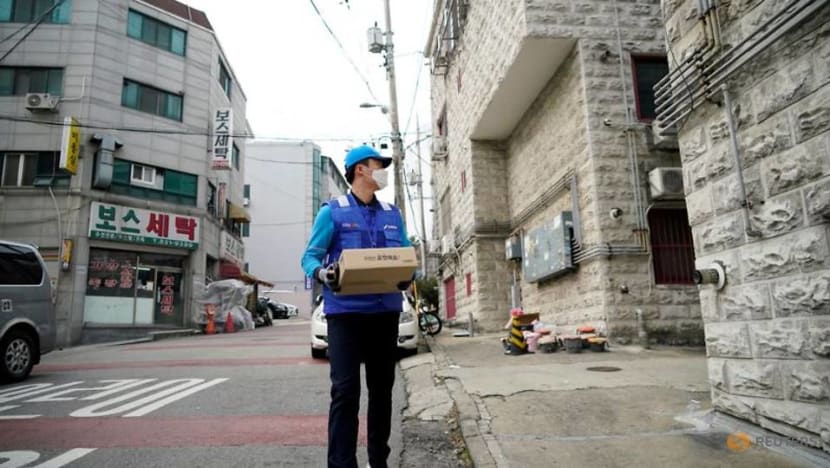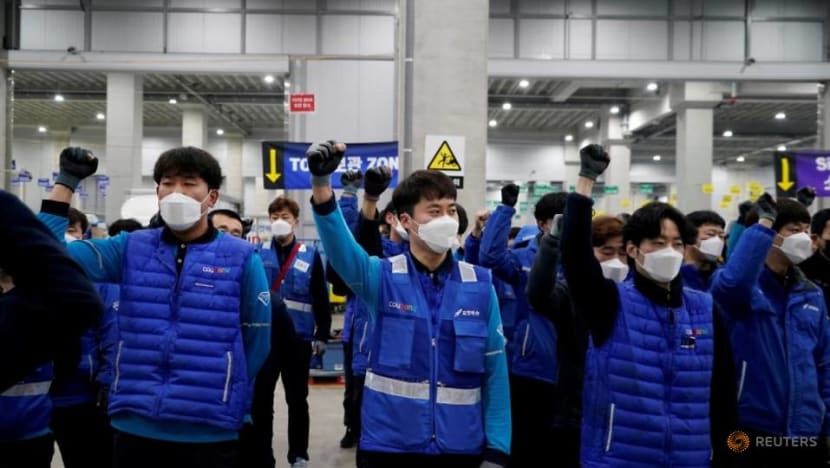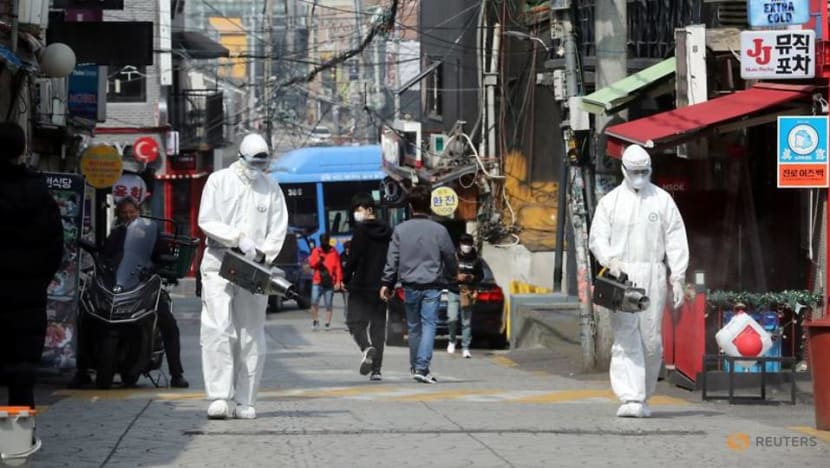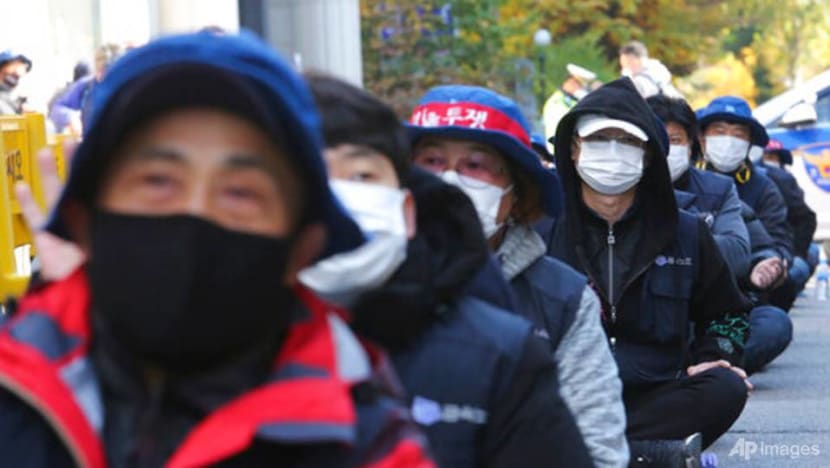commentary Commentary
Commentary: Guaranteed next-day deliveries in South Korea are coming at a heavy price
It is worth considering according low-wage workers, who currently fall outside the remit of labour laws, full employment status, says Steven Borowiec.

A delivery man for Coupang Jung Im-hong wearing a mask to prevent contracting the coronavirus, checks an address as he works in Incheon, South Korea, March 3, 2020. (File photo: REUTERS/Kim Hong-Ji)
SEOUL: In South Korea, if you sign up for Coupang’s Rocket Wow service, you can order fresh food in the evening, and have it appear on your doorstep early the following morning, in a smart-looking cooler, stored with ice packs to keep it cool.
This convenience offered by most food delivery companies extends to online shopping and consumer goods, from electronics to clothing, where the consumer is king.
In fact, if you decide to return something you’ve bought, you can also simply leave it on that same doorstep for collection.
In a country where many people work or study long hours and sleep less than the global average, such a service can be a huge time saver. And the membership fee is just a few US dollars per month.
Rocket Wow, along with services by competing companies in the delivery market, has gained huge popularity for saving millions of South Korea countless trips to the store and has been a national boon.
During the coronavirus pandemic, it has made it easier to avoid public places and reduce the risk of COVID-19 spreading.
READ: South Korea food delivery giants rev up rider race amid COVID-19 boom
READ: Commentary: Every day feels like 11.11 since COVID-19
The delivery market is booming. The number of parcel deliveries nationwide has nearly doubled since 2012 as more people become accustomed to online commerce and delivery companies compete to offer faster and less expensive services, according to government data.
However, if you ask labour advocates, workers are literally dying to provide this service.
A NATIONAL SOUL-SEARCHING
This year labour advocates groups have said that at least 14 delivery men have died as a result of excessively strenuous work.

Some collapsed on the job, with advocates claiming the pressure to deliver huge numbers of parcels according to a strict schedule have caused physical exertion and cardiovascular stress that resulted in these deaths.
For now, the state forensic agency has found no causal link between the deaths, following autopsies, and concluded some of the deceased had underlying health conditions.
The news has nevertheless touched a raw nerve in South Korean society, where the plight of low-wage workers has come under the public spotlight in recent years.
READ: Commentary: South Korean workers have been bullied for far too long
The contrast could not be greater, seeing that the country has just enjoyed another record-breaking Chuseok holiday sale in September, with online transactions that month totaling 14.72 trillion won (US$12.9 billion), up 30 per cent compared to last year.
Alongside all this convenience, these highly publicised deaths are making more aware of the human toll of the system. When perishable items like groceries are guaranteed to arrive by morning, people are being sensitised to the reality that these little conveniences require drivers and packers to toil overnight.
LISTEN: How Malaysians are getting through a never-ending fight with COVID-19
LACK OF JOB OPTIONS
Amid a national soul-searching, some have asked, if these jobs are so bad, why don’t the drivers simply quit and go do something else?

But there are few better options out there for jobseekers with limited education and skills than these roles, which pay about 2 to 3 million won (US$2,000 to US$3,000). With families to feed, quitting and waiting around until something better comes along isn’t an option.
It has long been the case in this country that if you don’t excel at school or have family connections, there are few paths to well-paid employment, and that is only more so now.
While the South Korean economy has absorbed the shock of the coronavirus pandemic better than most other developed countries, the job market is still in a dire state, with the country shedding jobs every month since March, when the effects of reduced consumption due to the coronavirus pandemic began to take effect.
READ: Commentary: Will COVID-19 spell the end of strata malls?
READ: Commentary: Those who can afford it must spend more to save the economy
The job losses are mounting, with no end in sight. According to the national statistics agency, as of October, there were 421,000 fewer employed people in the country than in the same month last year.
THE SCOURGE OF CONTRACT DELIVERY WORK
For all their hard work, delivery drivers earn low wages, with 12-hour workdays, six days per week.
They generally work on contracts, instead of being directly employed by the firms they work for, meaning they are not entitled to health insurance or paid sick leave and fall outside the remit of labour laws.
Instead of earning steady salaries, they are paid per delivery. Their work schedule is determined by algorithms, that, drivers say, don’t account for the possibility of traffic jams or other delays they can do nothing to prevent, meaning they end up having to scramble to make deliveries on time.
READ: Commentary: Multibillion-dollar wizards – how COVID-19 is exposing what’s behind the curtain
Companies can afford to pay drivers more but do not. CJ Logistics, one of South Korea’s largest, announced this week that in the third quarter of this year, the company turned a profit of US$42.2 million, up more than 265 percent from last year.

The recent deaths have drawn unusual attention to the plight of drivers, with stories of people hanging signs on the door with messages of encouragement for delivery drivers, telling them not to hurry too much, that it is okay if a delivery is late.
While such feel-good stories are nice to hear, there is no way of knowing if these recent deaths will lead to any kind of sustained change.
It was not that long ago that drivers from the major delivery companies and the national postal service gave delivery workers a day of rest in August when a moratorium was declared on deliveries.
The intention was to demonstrate appreciation for deliverers and recognise their arduous work. Yet, no significant commercial, policy or legislative changes occurred in the aftermath.
Though politicians are currently discussing legislation holding companies liable if a worker dies while on the job, South Korea’s ingrained culture of convenience also needs a good hard look.
READ: Commentary: 'Are you sick?' Why more South Korean women are doing away with cosmetics
READ: Commentary: Has COVID-19 made e-commerce and online shopping the new normal?
The current practice of low-cost, guaranteed next-day deliveries sends the wrong message to customers that they can enjoy both freshness and convenience, and that high quality products can arrive at their doorsteps quickly and inexpensively.
In a growing, lucrative market where a few big players dominate, a race to the bottom to offer the cheapest services will see delivery workers left without much recourse.
But it is the responsibility of these delivery companies to more fully recognise the value of the physical work that makes what they do possible, and increase workers’ wages and benefits, while also according them full employment status instead of stringing them along as independent contractors.
Meanwhile, as consumers, we should all be more mindful of the human cost of our convenience.
We would do well to remember that every package that appears on the doorstep was placed there by a pair of human hands.
Steven Borowiec is the politics editor of Korea Expose.












